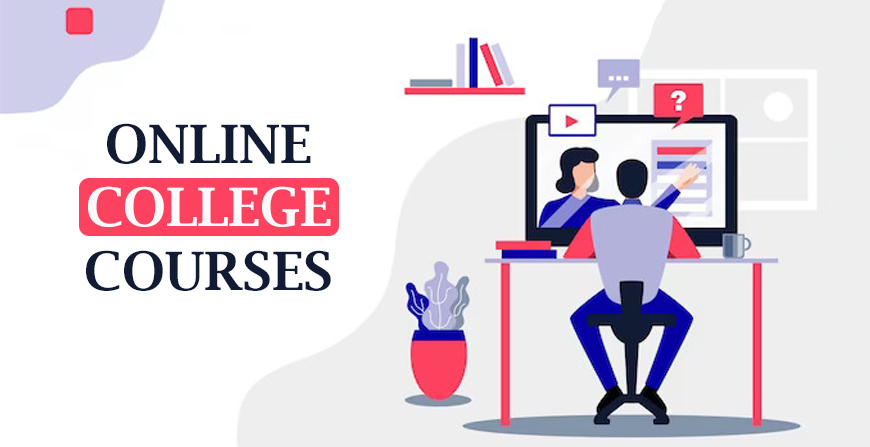The way we pursue higher education has been revolutionised by online college courses. Students can now receive high-quality education from the convenience of their homes. So, thanks to technological improvements.
This article investigates the world of online college courses, highlighting benefits, drawbacks, and educational effects.
Table of Contents
- Benefits Of Online Courses For College
- Overcoming Online College Course Challenges
- Tips For Success In Online College Courses
- Impact Of Online College Courses On Education
- Online College Courses vs. Traditional College
- Future Trends In Online Education
- Conclusion
- FAQs:
- Enroll In India’s No.1 Digital Marketing Certification Course
Benefits Of Online Courses For College
Online college courses provide unmatched flexibility. With the ability to design their own study timetables, students can juggle their studies with other responsibilities. That includes employment, family, and other commitments.
People who want to advance their education or get a degree without interfering with their everyday lives are drawn to the opportunity to learn at their own speed.
Additionally, there are numerous possibilities available with online college courses. Depending on their interests and career objectives, students can select from a wide range of areas and subjects.
This wide variety guarantees that students have the chance to explore many subjects and customise their education to meet their unique demands.
The affordability of online college courses is another key benefit. Tuition fees, living expenses, and travel costs all contribute to the high cost of a traditional college education. These extra expenses are removed from online courses, making education more inexpensive and available to a wider spectrum of people.

Overcoming Online College Course Challenges
While online college courses have many benefits, there are also obstacles that students must face. Time management and self-discipline are two such difficulties.
Students need to be very organised to keep on track. And also, they need to finish their schoolwork on time given the lack of a physical classroom and set timings.
Moreover, some students may find it challenging due to the restricted face-to-face interaction in online college classes. Networking, group projects, and in-person talks are opportunities offered by traditional universities.
However, online courses make up for this drawback by allowing students to interact with their peers and instructors remotely through virtual chats, online forums, and video conferences.
The success of online college courses is also greatly influenced by technical needs and assistance. In order to participate successfully, students must have access to a reliable internet connection. Also they need to have the necessary technology and software.
Institutions that provide online courses should offer technical assistance and tools to make sure that students can easily navigate the online classroom.
Tips For Success In Online College Courses
Students should set attainable goals and create a study schedule in order to succeed in online college courses. Setting attainable goals will help students stay motivated and move closer to finishing their courses.
To be focused and productive, it’s also essential to designate a location where you can study without interruptions.
Another essential component of success is active engagement in online debates. Collaboration and a deeper comprehension of the course topic are fostered by having meaningful dialogues with classmates and teachers.
Students can improve their educational experience. And also, they can widen their perspectives by exchanging ideas, posing inquiries, and providing insights.
Impact Of Online College Courses On Education
The rise of online college courses has broken down geographical barriers, having an impact on education. Since they may obtain the same caliber of education from anywhere in the world, students are no longer need to move to seek education at prestigious institutions.
People who previously couldn’t attend traditional institutions owing to financial or logistical restrictions now have access to higher education.
Additionally, online courses have increased access to higher education for professionals who are working. For many people, juggling professions and studies at the same time is difficult.
Online courses give students the freedom to study in the evenings or on the weekends. It enables the working professionals to advance their education while keeping their jobs.
Furthermore, online courses provide a variety of learning opportunities. Students might look into specialised topics or specialised fields that might not be offered at their local colleges.
This broadens one’s knowledge base and fosters intellectual curiosity. It results in a deeper comprehension of numerous topics.
Online College Courses vs. Traditional College
Although they have a number of benefits, online college courses are different from traditional college education in a number of ways.
Online courses offer a virtual learning environment without the physical presence of peers and teachers. Independent learners might find this to their liking.
But others would miss out on the networking and social opportunities provided by conventional colleges.
Physical presence and practical experience are necessary for several academic disciplines. Such as the practical sciences and performing arts.
Traditional colleges offer a better learning environment in these situations. However, even in these areas, online courses can support conventional instruction by providing theoretical information.
And also it can be deepening students’ subject-matter comprehension.
When choosing between online and conventional schools, it is important to examine the benefits and drawbacks of each strategy.
To make a well-informed choice, consider elements including individual circumstances, career ambitions, and learning preferences.
Future Trends In Online Education
Exciting opportunities exist for online education in the future. The immersive learning experience is anticipated to be improved by developments in virtual reality and augmented reality technology.
It will allow students to imitate real-world situations and develop useful skills in virtual settings.
Moreover, personalised learning opportunities are coming. The efficiency and efficacy of online college courses will be increased by adaptive learning platforms.
And also online courses will increase by artificial intelligence algorithms. This will personalise educational content to individual needs and learning preferences.
Furthermore, the distinction between online and traditional schooling will get increasingly hazy. Students will certainly benefit from hybrid models. These models include online and offline components since they provide them the best of both worlds.
This integration seeks to deliver a comprehensive learning experience that blends the advantages of in-person contact with the practicality of online courses.
Conclusion
The way education is provided and accessible has been revolutionised by online college courses. Online courses are a popular alternative for many people due to its flexibility, abundance of possibilities, and affordability.
Although there are difficulties, with the right time management, participation, and technical assistance. Students can get past these problems and thrive in their online education.
The future of online education presents enormous possibilities for extending access, personalisation, and innovation as technology continues to advance.
FAQs:
- Are online college courses as credible as traditional ones?
- Yes, online college courses from accredited institutions are recognized and hold the same credibility as traditional courses.
- Can I transfer credits from online college courses to a traditional college?
- It depends on the institution’s policies. Many colleges accept transfer credits from online courses, but specific requirements and restrictions may apply.
- How do employers view online college degrees?
- Employers generally view online college degrees favorably, especially if they are earned from reputable and accredited institutions. However, it is essential to showcase the skills and knowledge gained during the online program to demonstrate their value to potential employers.
- What technical requirements are needed for online college courses?
- Technical requirements may vary, but typically include a stable internet connection, a computer or laptop, and software applications or platforms specified by the institution. Some courses may also have additional requirements, such as specific software or hardware.
- Can online college courses provide a similar social experience as traditional college?
- While online college courses may lack face-to-face interaction, they offer virtual discussions, group projects, and online forums that facilitate social engagement among students. Although different from traditional college, these platforms provide opportunities to connect and collaborate with peers.
If you want to learn the practical aspects of “Digital Marketing” and also want to explore the field of digital marketing, you can enroll in Digital Marketing Course from Academy of Digital Marketing. Here you will master in digital marketing in just 4 months.
Enroll In India’s No.1 Digital Marketing Certification Course
For 10x Growth in Your Career & Salary


